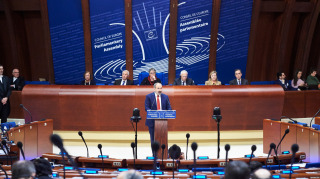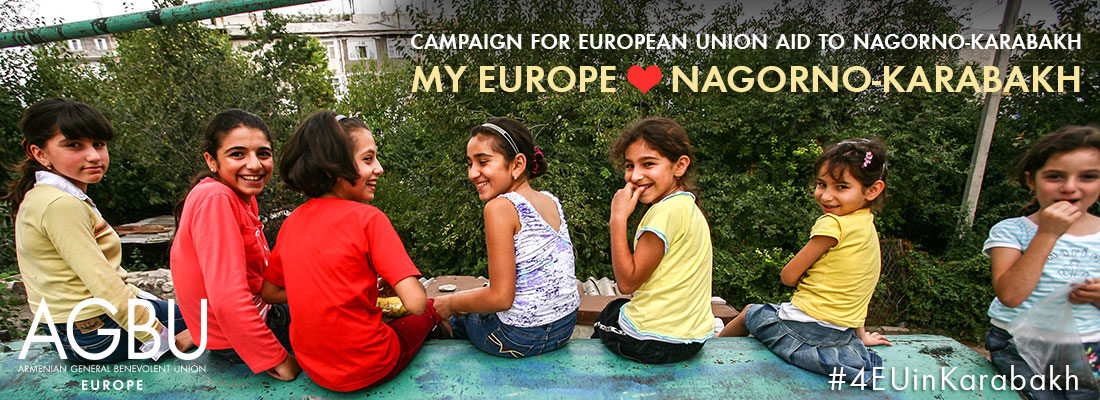- Armenian PM thanks the Council of Europe for its record of supporting democracy
- Armenian PM urges involvement to support the population of Artsakh.
After visiting the European institutions in Brussels in March, Armenia’s Prime Minister paid his first visit to the Council of Europe, in Strasbourg, on April 10 and 11 (1). This visit included a speech to the Council’s Parliamentary Assembly, which comprises members of parliament from all 47 Member States, and a meeting with the Council’s Secretary General, Thorbjorn Hagland. The occasions was used by the Armenian PM mainly to communicate his views on the organisation’s role in establishing democracy in Armenia and on the conflict of Nagorno-Karabakh.
“I appeal to the Council of Europe to help the people of Nagorno-Karabakh to improve their laws and institutions, and to promote human rights, the rule of law and independence of the judiciary. Human beings will benefit from that. Humans are worth much more than any documents, or any political or group’s interests.” PM Nikol Pashinyan to the Parliamentary Assembly of the Council of Europe
Both of these themes are important themes in the unfolding story of the Republic of Armenia and of its relationship with the rest of Europe. The opportunity for a small country’s Prime Minister to engage in dialogue with an assembly that represents the entire continent is also no ordinary moment.
The Council of Europe and the Velvet Revolution in Armenia
The PM began his speech to the Assembly with an account of his life as a journalist and later as an opposition politician. In 1999, for instance, then a journalist, Pashinyan was released from jail after Lord Russell-Johnston MP, representing the Council of Europe, inquired into his prosecution during a visit to Armenia. In 2011, when he was again in jail, but this time as an opposition politician, Pashinyan was visited in prison by the Council of Europe’s Commissioner for Human Rights, Thomas Hammarberg.
Pashinyan’s account aimed to illustrate how “Armenia’s 18 year-long membership of the Council of Europe [has] contributed to the consolidation of democratic institutions.”
Moving on to recount the events of the 2018 velvet revolution in Armenia, the PM emphasized, as he did at the European Parliament, that democracy is now firmly anchored in Armenia, and that it is the aspiration of the Armenian people, not a foreign import: “no one, no side has put pressure on Armenia. What happened proves once again that democracy is in the minds and hearts of our people.”
The declaration is in part a reference to a widespread tendency to view Armenia’s political transformation through the lens of Russia’s conflictual relationship with the West. Suspicions indeed still linger that Armenia’s Velvet Revolution might have been a project guided by external, presumably Western, forces.
Pro-Russia, Pro-West, Pro-Armenia
One Lithuanian MP thus asked the PM whether his “country in the future [will be] be more pro-European and less pro-Russian”, compelling the PM to commit to being “Pro-Armenia” and add “what does it mean to be pro-Armenia, in the international arena? It means that we must build a constructive relationship with all our international partners and try to resolve the issues that arise.”
Armenia’s situation, on Russia’s fringes, with hostile NATO power Turkey at its border, has compelled its successive governments to seek to reconcile its close relationship with the Russian-speaking world, with the West and with other neighbours and great powers. An experience apparently understood by one German MP, Mr Hunko, who suggested that “perhaps Armenia could serve as a model in these times of confrontation.”
Nagorno-Karabakh: promoting dialogue and involving Karabakh in the negotiations
Much of the visit was however dedicated to discussion of the conflict over Nagorno-Karabakh. The PM pleaded, as he has repeatedly done since his election, for more constructive dialogue and for the involvement of Artsakh (Nagorno-Karabakh) authorities in the Minsk-Group peace negotiations. He also pleaded for the involvement of CoE authorities in this small territory.
Regarding the involvement of Artsakh representatives in the negotiations, Pashinyan pleaded: “do we want to resolve the issue or not? […] How do we see the Nagorno-Karabakh issue being resolved without the involvement of Nagorno-Karabakh?”
Pashinyan pleaded with particular passion for Council of Europe engagement in Artsakh: “This Organisation [the Council of Europe], which promotes human rights and democratic institutions in Europe, has paid no attention whatever to supporting non-governmental organisations operating in Nagorno-Karabakh. PACE has taken no steps whatever to promote the consolidation of democratic institutions and the development of civil society in Nagorno-Karabakh. […] Nagorno-Karabakh is still not recognised internationally as a sovereign state, but is there international debate on whether the people living there are human beings? For the Council of Europe, a global pioneer in the protection of human rights, should documents prevail over real people?”
This plea, at least, was viewed favourably by the organisation’s Secretary General, Thorbjorn Hagland, who proposed after his meeting with Pashinyan“that the Commissioner for Human Rights [of the Council of Europe] be given a mandate and the right to visit these areas. I think it is possible. Political statements need to be made by the European governments to that effect. I am convinced that the Commissioner for Human Rights should have the opportunity to work in a non-political dimension for humanitarian purposes.”
Sources and further reading
(1) The Council of Europe is composed of 47 member states, including Armenia as well as all its neighbours except Iran. The organisation is most active in issues of human rights, the promotion of democratic institutions, the fight against corruption and peaceful cooperation within Europe generally.
(2) Pashinyan speech to the CoE http://assembly.coe.int/Documents/Records/2019/E/1904111000E.pdf
(3) AGBU Europe has long advocated the engagement of European institutions in Nagorno-Karabakh/Artsakh. Read our briefing (2017)



